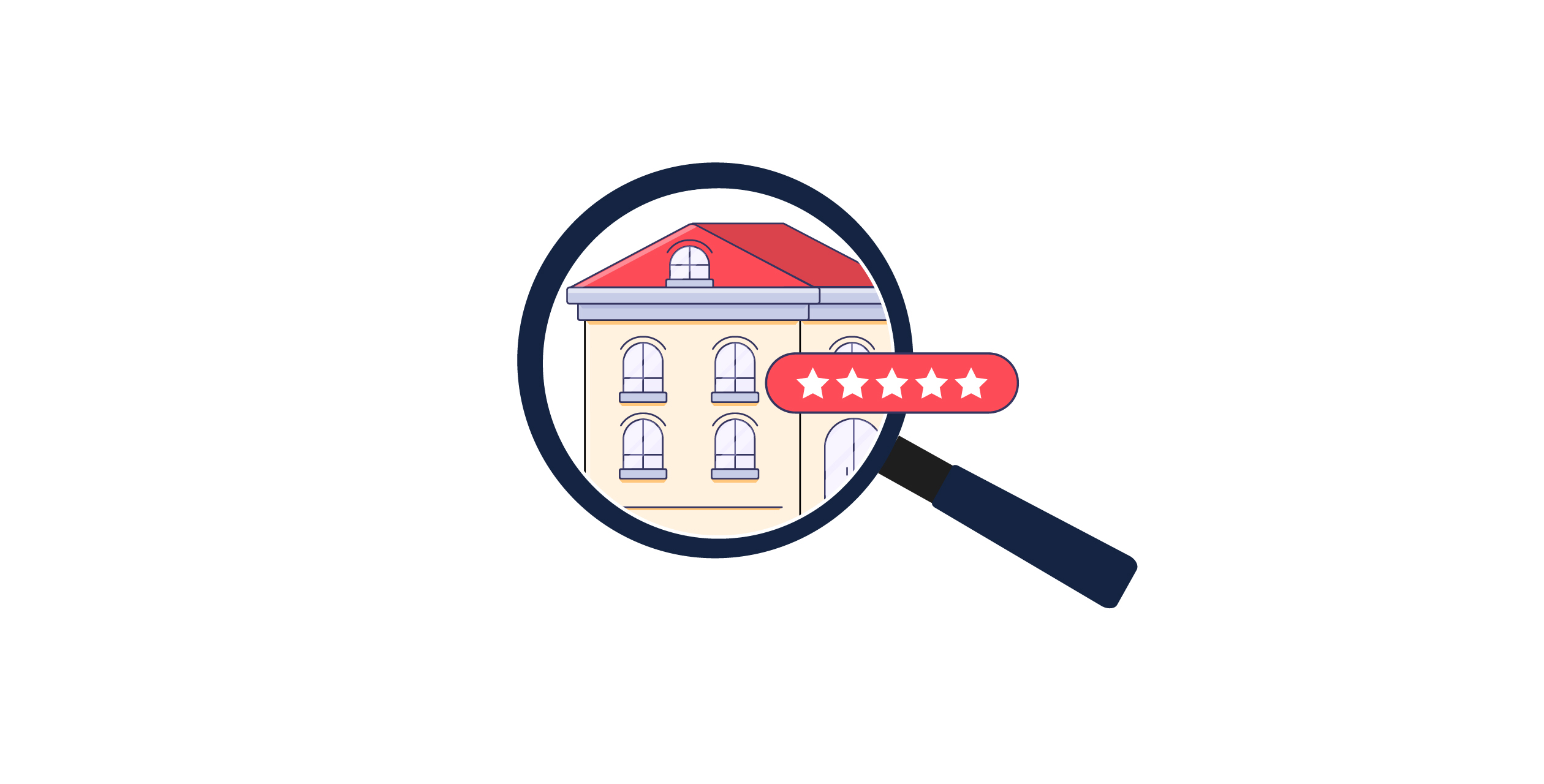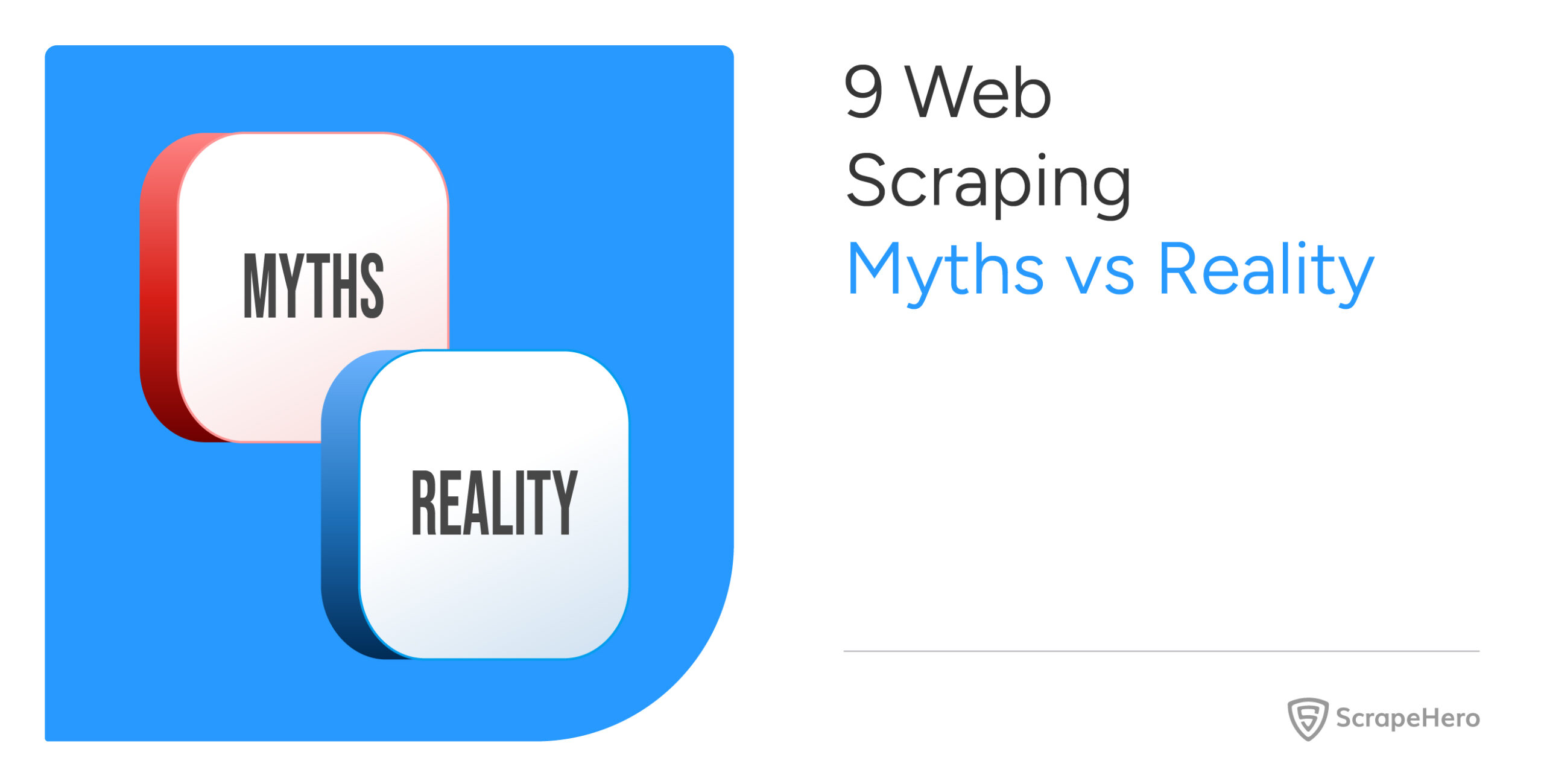The real estate market is constantly changing. Factors such as market fluctuations, technological advancements, shifting consumer preferences, and others contribute to this dynamism.
Therefore, real estate professionals cannot take risks; they must stay informed and adapt to changing market conditions. For them, web scraping real estate data is the way to go.
But what is web scraping real estate data?
What is Web Scraping Real Estate Data?
Real estate data scraping or web scraping real estate data is simply the automated collection of data from real estate websites.
But why do realtors so love scraping real estate data?
- Data analysis is an essential part of the real estate market
- Web scraping makes the collection of real estate data easier
So, what can be extracted from real estate data websites?
Don’t want to code? ScrapeHero Cloud is exactly what you need.
With ScrapeHero Cloud, you can download data in just two clicks!
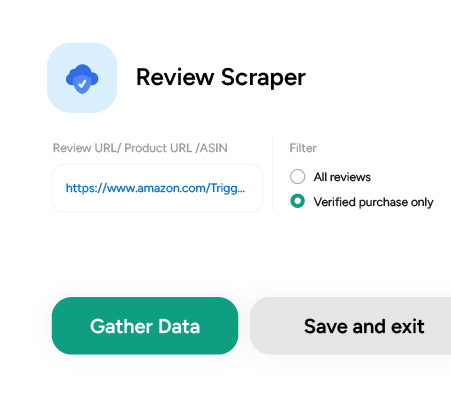
Types of Data Obtained by Scraping Real Estate Websites?
Real estate websites house a lot of data that can be analyzed to keep track of the market.
The types of data obtained by scraping real estate websites include:
- Property Address: The physical location of the property.
- Sale Price: The price at which the property was sold.
- Location: The neighborhood, city, or region where the property is located.
- Size: The square footage or area of the property.
- Monthly Rental Price: The price at which the property is rented.
- Property Agent: The real estate agent or broker handling the property.
- Days on Market: The number of days the property has been listed for sale.
- Year Built: The year the property was constructed.
- Images: Photos of the property.
Now, let us see how a realtor can make use of these data fields.
What are the Benefits of Scraping for Real Estate?
It is common sense that analyzing real estate data will lead you to discover various things about a market. Let us see what those benefits are exactly.
- Market trend analysis
- Competitive analysis
- Rental market insights
- Investment analysis
Market Trend Analysis
Employing web scraping, details such as listing prices, property descriptions, square footage, etc., can easily be gathered. These can then be analyzed to get a broad view of the market.
By continuously scraping data over time, you will be able to track the trajectory of prices over time. This will be beneficial for identifying patterns and trends, such as seasonal price fluctuations.
Competitive Analysis
By scraping real estate data from competitor’s listings, you can see how similar properties are priced. This way, you can price your properties strategically.
Detailed information about property features, like the number of bedrooms, location, etc, can be collected to understand what features are valued the most by buyers. This will also help you figure out how your properties compare to others on the market.
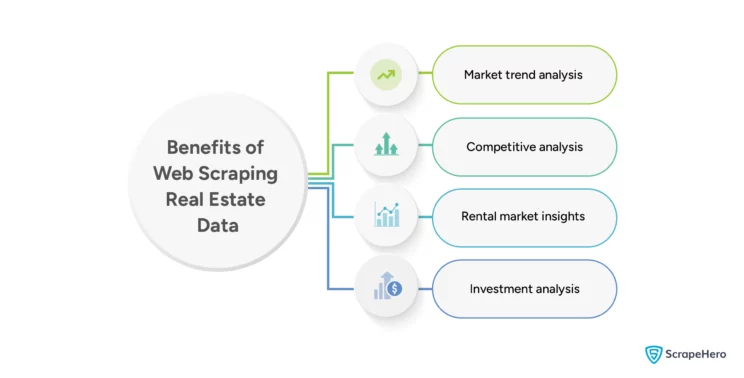
Rental Market Insights
Scraping rental listings can reveal pricing and availability. This can help you understand the rental market dynamics and set your rates competitively.
Details about the status of rental occupancy can shed light on market demand and potential rental income.
Investment Analysis
Access to a list of distressed properties, foreclosures, or auctions can help identify investment opportunities. Investors can find underpriced properties or properties that might be sold quickly, with the potential for high returns from this list.
Analyzing rental income data and property appreciation trends can help calculate the potential return on investment. This will also help investors make informed decisions.
How to do Real Estate Data Scraping?
Given below are the steps involved in scraping real estate data.
1. Identify target websites
Choose the website that best suits your data needs. Consider factors such as location coverage, property types offered, and the level of detail in the listings.
Plenty of real estate websites are available for scraping:
- Real estate listing and brokerage services
These are platforms that offer comprehensive real estate listings and also provide brokerage services.
Redfin is one such platform. They employ real estate agents and brokers to help clients buy and sell homes.
Try the ScrapeHero Redfin real estate data scraper to gather relevant data from Redfin. - Real estate listings and home value estimates
These are platforms that provide extensive home listings along with the tools to estimate home value. Zillow and Trulia are examples.
Use the ScrapeHero Zillow real estate data scraper to scrape real estate data like Zestimate and other data points from Zillow.
Also try the ScrapeHero Trulia real estate data scraper to easily extract data from Trulia. - Real estate listings and professional association
Realtor is affiliated with the National Association of Realtors (NAR) and restricts listings to licensed real estate agents.
Gather details from Realtor using the easy-to-use ScrapeHero Realtor real estate data scraper. - Real estate listings and general real estate information
There are also platforms like Homes.com that provide home listings along with other general information.
The ScrapeHero Homes.com real estate data scraper is a pre-built scraper you can use to extract Homes.com.
2. Setting up for scraping
You either need to develop a scraper from scratch or use a ready-made tool or rely on a service. Consider the complexity of the target website, the scale of your requirements, and your technical expertise when choosing a mode of scraping.
something like ‘you either develop a scraper from scratch or use a ready made tool or rely on a service. Consider the complexity of the target website, the scale of your requirements and your technical expertise when choosing a mode of scraping’
3. Data extraction
In this step, you will navigate the target website and identify the data points you’re interested in, such as property address, square footage, number of bedrooms, and price.
You will then extract this data in a structured format for easy analysis.
4. Data storage
Once extracted, your real estate data needs to be stored safely. You can choose to store it in a spreadsheet program like Microsoft Excel, Google Sheets, JSON, etc, for analysis.
Is it Difficult to Scrape Real Estate Data on your Own?
The benefits of real estate data scraping are undeniable, but the process can be a technical hurdle. Here’s why we think outsourcing this task might be the smarter move:
- Technical Expertise: Scraping data effectively often requires programming knowledge and familiarity with specific web scraping tools. Learning these skills can be time-consuming, especially if you’re unfamiliar with coding.
Familiarize yourself with the top 15 web scraping tools software. - Website Complexity: Most websites are built with intricate structures and often employ anti-scraping measures. Building and maintaining a scraper that can adapt to these complexities can be a battle.
- Data Accuracy and Consistency: Extracting clean and consistent data is crucial for meaningful analysis. Outsourcing to a reputable provider ensures experienced professionals handle the scraping process. Here the chances of errors and inconsistencies will be minimized.
Real estate data is rife with quality issues and a lack of consistency. Read about the challenges with the quality of real estate data. - Time Investment: The time spent building and maintaining a scraper can be better spent analyzing the data and making informed decisions. By outsourcing, you free yourself to focus on the strategic aspects of your real estate business.
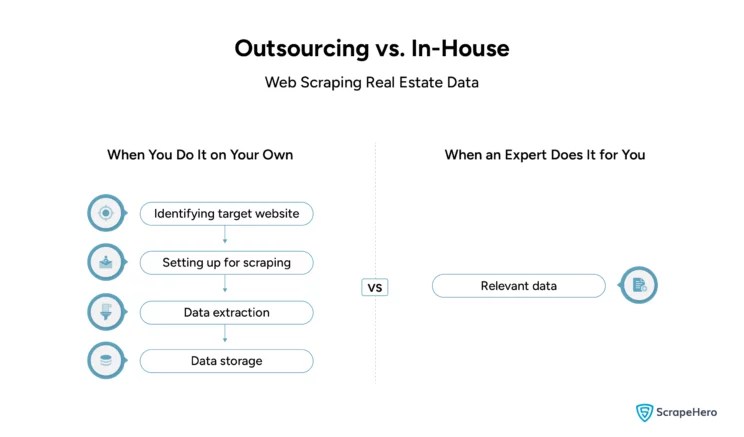
Thus, if you consistently require accurate and error-free real estate data, it is better to outsource to a reliable web scraping service provider like ScrapeHero.
Web Scraping Real Estate Data With ScrapeHero
ScrapeHero is an enterprise-grade web scraping service with over a decade of experience. Here is why your real estate data scraping requirements will be best done with ScrapeHero.
- Real estate scraping is one of our services
- We are a fully managed service; we do all of it for you
- We have a vast customer base with a 98% retention rate
- We promise privacy and keep your name and details safe
- Our AI-based quality checks ensure high data quality
- We are capable of scraping details from millions of pages daily
- We offer customization
- You can get the gathered data in any format- JSON, CSV, Excel, XML, and more.
So, if you need real-time real estate data that you can rely on, ScrapeHero can scrape real estate data for you. Our solution will be built based on your requirements, and completely configurable to your changing needs.

